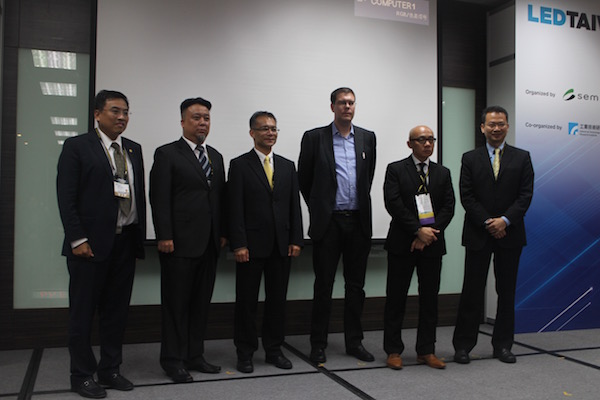(Author: Judy Lin, Chief Editor, LEDinside)
What’s next for the LED industry? Will CSP LEDs become a widely used light source in general lighting? These were some of the questions industry insiders asked at LED Executive Summit 2016 hosted by SEMI, which took place at Nangang Exhibition Centre, Taipei, Taiwan on Wednesday.
The LED market has become very challenging, due to lack of emerging new applications to digest manufacturers production capacity, said Titus Chang, Associate Vice President, Sales Center, Epistar. Over supply in the LED market is estimated to range from 15% to 20%, he added. New applications emerged for LED chip and package every year, but innovative large scale LED applications have failed to emerge since 2013.
Taiwan’s largest LED chip supplier is adjusting through three distinctive strategies, the first is moving away from the Level 0 category, or as a sole LED chip supplier through its virtual integration and co-activate partnership models. Secondly, the company continues to invest in LED chip technology including flip chip, and CSP LEDs to differentiate itself from market competitors.
Epistar’s core focus over the last two years has been its IR LED technology, where its inclusive LED chip wavelengths range from 530 nm to 1,000 nm can be widely applied in surveillance to home applications. New market sectors for potential IR LED applications include SpO2 sensors for pulse oximeter measurements that use 660 nm to 940 nm LED, proximity sensors in the 850 nm range, heart rate sensors, and virtual reality headsets. Rise of autonomous cars is also expected to spur IR LED demand in the sector.
 |
|
Left to right: Prof. Gou-Chung Chi, Chair Professor, National Chiao Tung University, James Wang, General Manager, MLS, Titus Chang, Associate Vice President, Sales Center, Epistar, Ralph Bertram, Director Product Definition, Business Segment Solid State Lighting, OSRAM Opto Semiconductors, Alvin Tse, Vice President for the Asia Pacific Region, Lumileds Commercial, Walter Chen, General Manager of Asia Marketing, Cree. (LEDinside) |
Market opportunities and challenges for CSP LEDs
CSP LEDs have caught on in the LCD panel backlight sector, but it is just a matter of raising market share, according to Chang. CSP LEDs are technically a five-sided light emitter, which makes it ideal for backlight applications, but probably not an ideal light source for single directional light emitting luminaires such as downlights, explained Alvin Tse, Regional Vice President of Sales, Lumileds Hong Kong.Tse was optimistc CSP LEDs elimination of ceramic sub mounts made it an ideal light source for high power streetlight applications, and offered greater flexibility in the luminaire design. Furthermore, the technology offers some protection for manufacturers, since it is harder to imitate and copy compared to high power 3535 LEDs.
Not all vendors agreed, though.
“I think CSP LED is mostly market hype,” said Ralph Bertram, Director, Product Definition, Solid State Lighting, Osram Opto Semiconductors (Malaysia). “It is the future for some applications, but not for all applications.”
He brought to light while CSP LEDs seem to be able to save costs by removing a lot of LED packaging materials, such as the leadframe, mould compound and wire bond to name a few, miniaturization of the chip also significantly raises the chip cost to more than 50% out of the entire package cost structure. Smaller chip sizes make it technically more difficult for manufacturers to place and mount, while tinier chips make thermal dissipation more tasking.
Bertram highlighted there are still other alternative options to CSP LEDs in low to mid power LED applications, and traditional LED package are just as capable as CSP LEDs. While lack of lenses in CSP LED designs can save component costs, it is also one of the reasons that make the chip’s light emission less efficient than traditional LED chips, he explained.
Asked why there was so much market hype around CSP LED sector, Bertram responded: “There is not any new applications, everyone is looking for innovation.”
Speaking of innovation, smart lighting is still a sector many manufacturers are developing. Cree for instance has collaborated with CISCO to develop smart LED lights that run on PoE, said Walter Chen, Gm of Marketing APEC, Taiwan Cree Electronics. Asked when the smart lighting will pick up in residential lighting sector, Chen noted lack of industry collaboration was preventing the permeation of smart lighting in the sector. As for when the industry might be seeing LED luminaries that follow TM 30 standards, Chen projected it will happen next year earliest.
To sum up, manufacturers are eagerly searching for the next big application. With LED market conditions becoming increasingly arduous, companies are redeploying market strategies either through the formation of new strategic partnerships to diversify product portfolios, or focusing on existing technology strengths in niche lighting markets where profits are more lucrative such as IR or UV LED. CSP LED market will in the short run still mostly be used in backlight, flash or might replace certain high power LED applications, but there are still no evident cost benefits of using the chip in general low-mid power LEDs.












